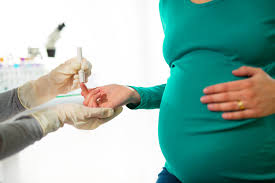By this stage, you may be experiencing the common early signs of pregnancy which includes feeling sick, tired, needing to urinate more frequently than usual, swollen and tender breasts, constipation, disliking foods that you normally relish and craving foods that you do not usually crave.
During your antenatal care, you may be offered the following tests or procedures. Also do look out for our Antenatal Packages and Antenatal Programme offered.
In the first 13 weeks of pregnancy (counted from the first day of your last menstrual period), the changes occur at an astonishing rate:
THE FIRST TRIMESTER
Week 3 – 4 The embryo is no more than the size of a grain of rice, as it attaches to the uterus.
Week 4 -5 The body structures are starting to develop
Week 5 -6 The head is beginning to form and the heart is beating. This can be seen on an ultrasound scan.
Week 6 – 8 All internal organs are formed and the embryo is now about 1 inch long. The limbs, no more than tiny buds at first are now visible.
Week 10 -11 The foetus moves around (although you will not be able to feel it yet); eyes are formed; fingers and toes are forming.
Week 12 – 13 External genitals are forming; facial features are distinguishable, muscles are inceasing in strength, movements are becoming more vigorous.

What You Can Expect
You are likely to schedule an antenatal visit around 6 weeks into your pregnancy as you have missed your first period. An ultrasound scan may be done to confirm the age of the foetus, check for the heartbeat and for more than one foetus. Antenatal care for the first three months involves a range of tests and is intended to identify any unknown risk factors. Your obstetricians will discuss the results with you and your partner.
You will experience fatigue and more fatigue. Do everything you can to rest your body and give it the fuel it needs for the development of the baby. Eat regularly and well at least three times a day and avoid unhealthy food and alcohol. Avoid foods that may harbour dangerous organisms: unpasteurised milk, soft mould ripened cheese, soft ice cream from a machine, fish and meat stored unwrapped at a deli, pre-cooked or pre-roasted poultry and cook chilled foods.
For constipation and morning sickness, both common during this point in the pregnancy, eat as much fruits, vegetables and wholegrain products as possible. Drink at least eight glasses of water a day. Get out of bed slowly, use deep breathing and relaxation techniques to overcome morning sickness. Indigestion and heartburn are common during pregnancy. Allowing plenty of time for digestion after a meal will help this.
There are many ways in which you can help and nurture yourself that may benefit you during this stage of pregnancy. Continue to exercise if you exercised before. If you didn’t exercise, ask your obstetricians how to start safely while in pregnancy. You must take care not to over-exert yourself as it is more difficult to recover when you are pregnant.
THE SECOND TRIMESTER
Week 14 – 16 The foetus is fully formed, has all vital organs and is gaining weight fast. It can stretch, turn its head, open its mouth, yawn and frown.
Week 18 First movement may be felt by the mother as the foetus kicks, bumps, twists, turn and pushes against the springy uterus wall.
Week 20 Teeth are starting to form in the jawbone and hair is growing. The foetus is now about 10 inches long. Your doctor will conduct an ultrasound screen to detect abnormalities
Week 24 Fingernails have formed, thumb sucking and hiccups begin. The eyes open occasionally. The length is now about 13 inches.
Week 27 Body fat is forming, the body is coated with waxy vernix, which prevents its skins from becoming soggy in the amniotic fluid. The length is about 14.5 inches now.
What You Can Expect
As experienced during the earlier months, indigestion and constipation may occur. Choosing foods carefully and allowing plenty of time for meals as digestion will take longer now.
Make sure you take some time every day to do something that gives you pleasure, but do note that you will feel tired very easily so you should have regular rests. Stretch marks may also start to appear at this stage. This is also the last chance to travel before your tummy gets too big.
THE LAST TRIMESTER
Week 28 The foetus almost completely fills the uterus and may turn head down. You feel much kicking and fluttering of feet and hands.
Week 32 All parts are now developed and the lungs are maturing
Week 36 The head will probably engage now if this if your first baby. Cord is slippery, making it unlikely to knot during constant twisting and turning.
Week 40 Most babies are pointing head down by now; the head is the heaviest part of the body and its weight can stimulate labour. You are ready for birth anytime.



